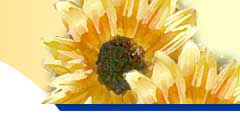



Test your Knowledge: True or False Answers
1. The nutrients in food can be recycled.
Answer:
True, nutrients are continuously recycled through the food chain.
2. Paper is biodegradable.
Answer:
True, paper is made from tree fiber which, like any organic material,
will rot down into soil.
3. Plastic wrap should go into the compost.
Answer:
False, plastic is not biodegradable, at least not within our lifetime.
4. Changing food into soil takes two weeks and three days.
Answer:
False, the speed of the composting process varies according to
how the pile is set-up and managed.
5. Orange peels can not be composted.
Answer:
False, orange peels are perfect for the compost pile. Anything once
living (organic material) will decompose.
6. Worms are decomposers.
Answer:
True, among many other insects.
7. Decomposers in a compost pile need oxygen.
Answer:
True, insect decomposers need oxygen. We want oxygen-loving (aerobic)
bacteria to thrive in the pile since they do much of the work. Some decomposers
(anaerobic bacteria) survive without oxygen, but they produce an awful
smell.
8. It doesn't matter if the compost pile is turned as long as it is wet.
Answer:
False, turning the pile speeds up the composting process by introducing
fresh oxygen for the decomposers. A pile that is too wet becomes ideal
for anaerobic (without oxygen) bacteria.
9. The product of a compost pile is similar to topsoil.
Answer:
True, the end-result of the composting process is a humus-like
soil.
10. Nutrients move through the food chain.
Answer:
True, this is also called the circle of life.
11. The best way to get rid of leaves is to put them in plastic bags for
curbside pick-up.
Answer:
False, not only does Connecticut law prohibit putting leaves in
the trash, it is also a waste of a valuable material for composting.
12. When compost gets compacted, it smells.
Answer:
True, this is because there is a lack of air pockets, and the anaerobic
(without oxygen) bacteria have taken over the pile. They give off a rotten
egg odor. Phew!
13. The center of a working compost pile is very cool.
Answer:
False, the center is the hottest part of the pile, where there
is the greatest concentration of decomposers. The heat is from the activity
of the decomposers.
14. Compost piles are always very smelly.
Answer:
False, they only smell if they go anaerobic or if there is a lot
of meat in the pile.
15. Nature recycles.
Answer:
True, cycles are an intrinsic part of life.
16. People who live in apartments can't compost.
Answer:
False, they can use a small worm bin under their kitchen counter
to compost their vegetative waste.
17. Composting is one way to recycle.
Answer:
True, composting is nature's way of recycling. Recycling cans,
bottles, paper and cardboard, is humans' way.
18. Decomposers need only food and air to do their work in a compost pile.
Answer:
False, the also need moisture.
19. Yard scraps, such as grass clippings and leaves, can be composted.
Answer:
True, grass clippings and leaves compliment each other nicely in
the compost pile. Grass is rich in nitrogren and leaves are rich in carbon,
providing a balanced diet for the decomposers.
20. Composting works only if it is done in a specially designed compost
bin.
Answer:
False, there are many ways to set-up a compost pile.
21. Animals are less attracted to the compost pile if meat and bones are
not put into it.
Answer:
True, meat and bones are slow to decompose and tend to be odiferous
in the process, which attracts animals.



Add up the number of answers you got right.
Where are you in your compost learning? Are you a compost wizard, compost apprentice, compost seeker or compost novice?
If you got:
21 to 18 answers right then you are a compost wizard. Your job as wizard is to share what you know by starting a composting project at home, in your neighborhood or at school.
17 to 14 answers right then you are a compost seeker. Your job as seeker is to seek out apprentices and novices to bring them along in the ways of composting. The best way to learn is to teach.
13 to 10 answers right then you are a compost apprentice. Your job as apprentice is to take instruction from the seeker and help out the novice.
9 to 0 answers right then you are a compost novice. Your job as novice is to let the seekers and apprentices teach you about the ways of composting.
Home
| Overview | About
| Benefits | Glossaries
Links | Microbes |
Setup | Inside | Activities